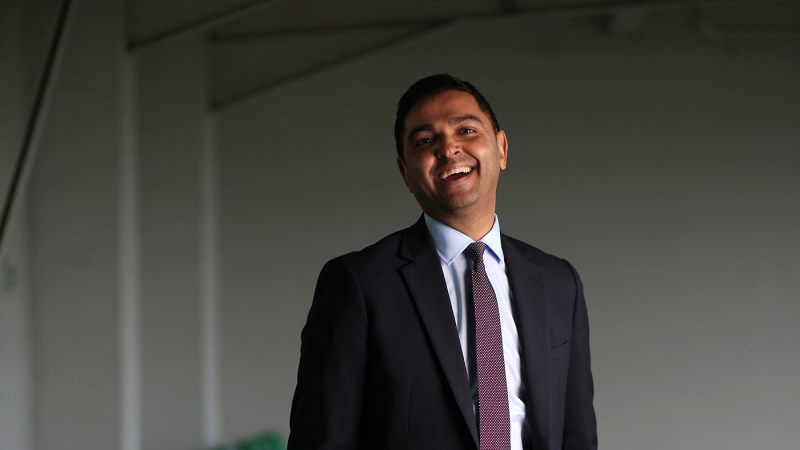Wasim Khan, Leicestershire’s chief executive, has been unveiled as the new managing director of the Pakistan Cricket Board.
Wasim, who has been one of the leading lights of the ECB’s drive to engage British Asians in English cricket, forged his career as chairman of the schools’ cricket charity, Chance to Shine, before taking over at Grace Road in 2014.
He is understood to have been appointed to the PCB on a three-year contract, starting on February 1. He was sounded out for the role by Ehsan Mani, the former ICC chairman who was himself appointed as PCB chairman earlier this year by the country’s new Prime Minister, the former Pakistan allrounder Imran Khan.
“I am delighted to be offered the position of Managing Director of PCB – a role which I have accepted as a challenge,” said Wasim. “I have my roots in Pakistan, a country which is full of talent. I will be relocating to Pakistan with my family who are as excited as I am.”
Mani added: “We welcome Wasim who will be joining the PCB soon. He was selected unanimously following a robust interview process with some seriously good candidates. I must thank each and every applicant who participated in this process.
“Wasim brings with him fresh ideas and knowledge of cricket, and he will receive the support of the Board and the management of PCB.
“We have started the process of revamping the PCB and under Wasim, we now have an experienced leader of the management team who will oversee the implementation of the Board decisions. His first task would be to oversee the reforms of domestic cricket structure”.
Wasim’s departure is a blow to the ECB and, perhaps, sport in general in England and Wales. He is believed to be the only chief executive of BAME (black, Asian or minority ethnic) heritage at a professional sports club in the country and has long argued for greater ethnic inclusivity throughout the sport. At a time when English cricket is trying to reach out to Asian communities in particular, his departure leaves the game poorly represented.
For the PCB, on the other hand, the recruitment is something of a coup – especially as Wasim is understood to have been asked to apply for the ECB’s own vacancy, the England team MD role that Andrew Strauss recently relinquished for personal reasons.
The esteem in which Wasim is held in England circles was made clear in April, when he was appointed as chair of the ECB working party that was tasked with restructuring the domestic game for 2019. He remains a strong candidate to return to English cricket one day as the ECB’s chief executive.
Constitutionally, Mani will retain significant executive powers within the PCB’s new hierarchy, but Wasim is expected to take a lead role in the board’s corporate governance framework, working with all the PCB’s board-of-governors committees.
He will have a major say in the execution of approved strategies – in particular the reinvigoration of Pakistan’s domestic cricket, with a proposed move to eight regional sides – and is also expected to oversee the development of the PCB senior management executives to improve the board’s functionality and professionalism. At present it is thought that the board employs somewhere in the region of 900 people, at an annual budget of over Rs. 500million.
The ultimate feather in Wasim’s cap, however, would be to oversee the return of regular international cricket to Pakistan. In recent seasons, the successful staging of the PSL final (and latterly the semi-finals) has begun the process of bringing top-level sport back to the country, while Zimbabwe, West Indies and a World XI have all visited without incident since 2015.
However, Pakistan has not hosted a Test tour since the attack on the Sri Lanka team bus in March 2009, and England have not visited since December 2005. Wasim will hope that his excellent relationship with ECB officials will help change perceptions about the country. In addition, as a long-time supporter of the PCA (the Professional Cricketer’s’ Association; the players’ union in England and Wales) he may also look to introduce a players’ union for Pakistan cricketers that would oversee the fight against corruption and doping.
The role is sure to bring a vastly different set of challenges for Wasim, not least at a cultural level. He himself is British-born, having grown up in Birmingham, but he intends to relocate with his family to Lahore, the city in which his wife’s parents have roots.
In his playing days, Wasim was a member of the Warwickshire squad that won the double in 1995. In addition to his administrative roles within cricket, he has also sat on the Equality & Human Rights Commission Sports Group, The Prince’s Trust Cricket Group, the board of Sport England and was recently named in the Parliamentary Review Muslim 100 Power List.
At present, the day-to-day workings of the PCB are centred on the Chief Operating Officer, Subhan Ahmad, who is among the board’s longest-serving employees, having started his career as a data analyst 20 years ago. He has worked alongside four previous chairman – Ejaz Butt, Zaka Ashraf, Shahrayar Khan and Najam Sethi – prior to Mani’s appointment.
In a further indication of the board’s renewed ambition, Sami-ul-Hasan, the ICC’s highly rated head of communications, has agreed to take on the same role at the PCB.
